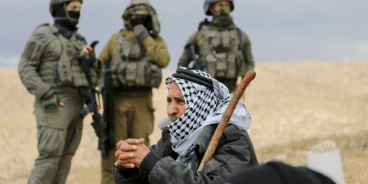
Atrocity Alert No. 87: Syria and the Democratic Republic of the Congo
Atrocity Alert is a weekly publication by the Global Centre for the Responsibility to Protect highlighting situations where populations are at risk of, or are enduring, mass atrocity crimes.
Talking Peace While Waging War on Civilians in Syria
As the seemingly intractable conflict in Syria heads toward its seventh anniversary, over 6 million Syrians are still internally displaced and mass atrocities continue. While some sections of the international community are focusing on reconstruction plans and Russia is hosting upcoming peace negotiations, up to 400,000 people remain besieged in eastern Ghouta. Across the country, millions of ordinary Syrians face another year of war and political intransigence as those responsible for their misery escape accountability.
Although the opposition-held areas of Idlib and eastern Ghouta were nominally designated “de-escalation zones” following the May 2017 Astana talks, increased fighting between government and armed opposition forces across both regions has led to hundreds of deaths in recent weeks and displaced tens of thousands of civilians.
Last Monday, 8 January, the Syrian Observatory for Human Rights reported that in the previous eleven days at least 126 people, including 29 children, were killed in airstrikes in eastern Ghouta. This included at least 30 civilians killed in a 4 January airstrike on a residential area, and a further 17 civilians killed in airstrikes on 6 January. Over 125 children still require emergency medical evacuation from the besieged enclave. Responding to the latest airstrikes, earlier today the UN High Commissioner for Human Rights said that, “the suffering of the people of Syria knows no end.”
At the same time, an escalation of violence in Idlib governorate has forced over 60,000 people to leave their homes since 1 November, according to the UN Office for the Coordination of Humanitarian Affairs. At least 27 civilians were killed in a suspected car bomb attack in Idlib city on 7 January, for which no party has yet claimed responsibility, and an additional 15 people were killed by airstrikes across the governorate that same day.
All sides of Syria’s civil war also continue to commit war crimes as they target health workers and medical facilities. According to the Union of Medical Care and Relief Organizations, 10 hospitals within eastern Ghouta and Idlib governorate suffered direct attacks between 27 December and 6 January. Attacks on medical facilities and civilian infrastructure demonstrate complete disregard for International Humanitarian and Human Rights Law, and directly contravene UN Security Council Resolution 2286.
Without tangible evidence of progress towards a political resolution of the conflict, talk of reconstruction deals with the Syrian government are, at best, premature. While the current possibilities for collaborative diplomacy regarding Syria appear remote, the international community – and the UN Security Council – should demand UN access to monitor so-called “de-escalation zones” in order to ensure the well-being of civilians. All UN member states should also meaningfully engage with the UN’s International, Impartial and Independent Mechanism to assist in the investigation and prosecution of all perpetrators of atrocities in Syria, including non-state armed groups and those responsible for deliberately besieging and bombing civilians.
Deadly Protests and Political Crisis in the Democratic Republic of the Congo
On 31 December at least eight civilians in the Democratic Republic of the Congo (DRC) were killed when security forces – firing live ammunition and rubber bullets – attempted to suppress peaceful political demonstrations in Kinshasa and other cities. Because the protests were encouraged by Catholic activists, there were also reports of the security forces firing tear gas into churches and blocking people from entering religious services. According to the UN, following the violence human rights monitors were denied access to morgues, hospitals and detention centers.
The demonstrations marked the one-year anniversary of an agreement between the government and opposition regarding the holding of presidential and legislative elections by the end of 2017. The agreement, facilitated by the Conférence Episcopale Nationale du Congo (CENCO), was negotiated after the government failed to hold elections prior to the end of President Joseph Kabila’s constitutional mandate in December 2016. Significant delays in implementing the CENCO agreement resulted in the government announcing 23 December 2018 as the new election date.
The current crisis comes at a key moment in the history of the Democratic Republic of the Congo. More than one year after his constitutional mandate ended, and despite widespread opposition, Kabila continues as President. Meanwhile, last year the DRC experienced the largest number of newly displaced persons in the world – with over 1.9 million forced to flee violence. Ongoing armed conflict between predatory militias and government troops in the Kasaï region and in the east of the country continues to threaten the safety and security of millions of Congolese. While there have been some recent positive steps towards accountability for mass rape, the ongoing threat of further mass atrocities across the DRC is real and immediate.
Freedom of assembly is a fundamental human right. As the country proceeds towards the 2018 elections, the government must ensure that the security forces exercise maximum restraint during peaceful demonstrations. The government must also fulfill its obligations under the December 2016 CENCO agreement, including adhering to the new election timetable. The future safety and security of the DRC depends, in part, upon President Kabila now taking meaningful steps towards ensuring a peaceful transfer of power.


Atrocity Alert No. 445: Sudan, Syria and Eritrea
